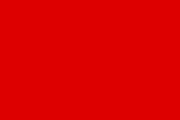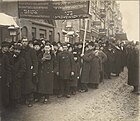
Back الجبهة اليهودية العامة Arabic Bund Azerbaijani Бунд Byelorussian Бунд BE-X-OLD Бунд Bulgarian Unió General de Treballadors Jueus de Lituània, Polònia i Rússia Catalan Bund Czech Bund (arbejderorganisation) Danish Allgemeiner Jüdischer Arbeiterbund German Bundo Esperanto
General Jewish Labour Bund in Lithuania, Poland and Russia אַלגעמײנער ייִדישער אַרבעטער־בונד אין ליטע, פּױלן און רוסלאַנד | |
|---|---|
 | |
| Founded | 7 October 1897 |
| Dissolved | 19 April 1921 |
| Merged into | Russian Communist Party (Bolsheviks) (majority faction) Communist Party of Lithuania (members in Lithuania) |
| Succeeded by | General Jewish Labour Bund in Poland "Bund" in Latvia Social Democratic Bund |
| Ideology | |
| Political position | Left-wing |
| Party flag | |
 | |
| Part of a series on |
| Bundism |
|---|
 |
| 1890s to World War I |
|
| Interwar years and World War II |
| After 1945 |
|
| People |
| Press |
| Songs |
| Associated organisations |
| Splinter groups |
|
| Categories |
The General Jewish Labour Bund in Lithuania, Poland and Russia (Yiddish: אַלגעמײנער ייִדישער אַרבעטער־בונד אין ליטע, פּױלן און רוסלאַנד, romanized: Algemeyner Yidisher Arbeter-bund in Lite, Poyln un Rusland),[2] generally called The Bund (Yiddish: דער בונד, romanized: Der Bund, cognate to German: Bund, lit. 'federation' or 'union') or the Jewish Labour Bund (Yiddish: דער יידישער ארבעטער־בונד, romanized: Der Yidisher Arbeter-Bund), was a secular Jewish socialist party initially formed in the Russian Empire and active between 1897 and 1920. In 1917, the Bund organizations in Poland seceded from the Russian Bund and created a new Polish General Jewish Labour Bund which continued to operate in Poland in the years between the two world wars. The majority faction of the Russian Bund was dissolved in 1921 and incorporated into the Communist Party. Other remnants of the Bund endured in various countries. A member of the Bund was called a Bundist.
- ^ Laqueur, Walter (2003). The History of Zionism. Tauris Parke Paperbacks. p. 273. ISBN 978-1-86064-932-5.
- ^ N. A. Bukhbinder: The History of the Jewish Labor Movement in Russia. According to unpublished archive material. Tamar, 1931.